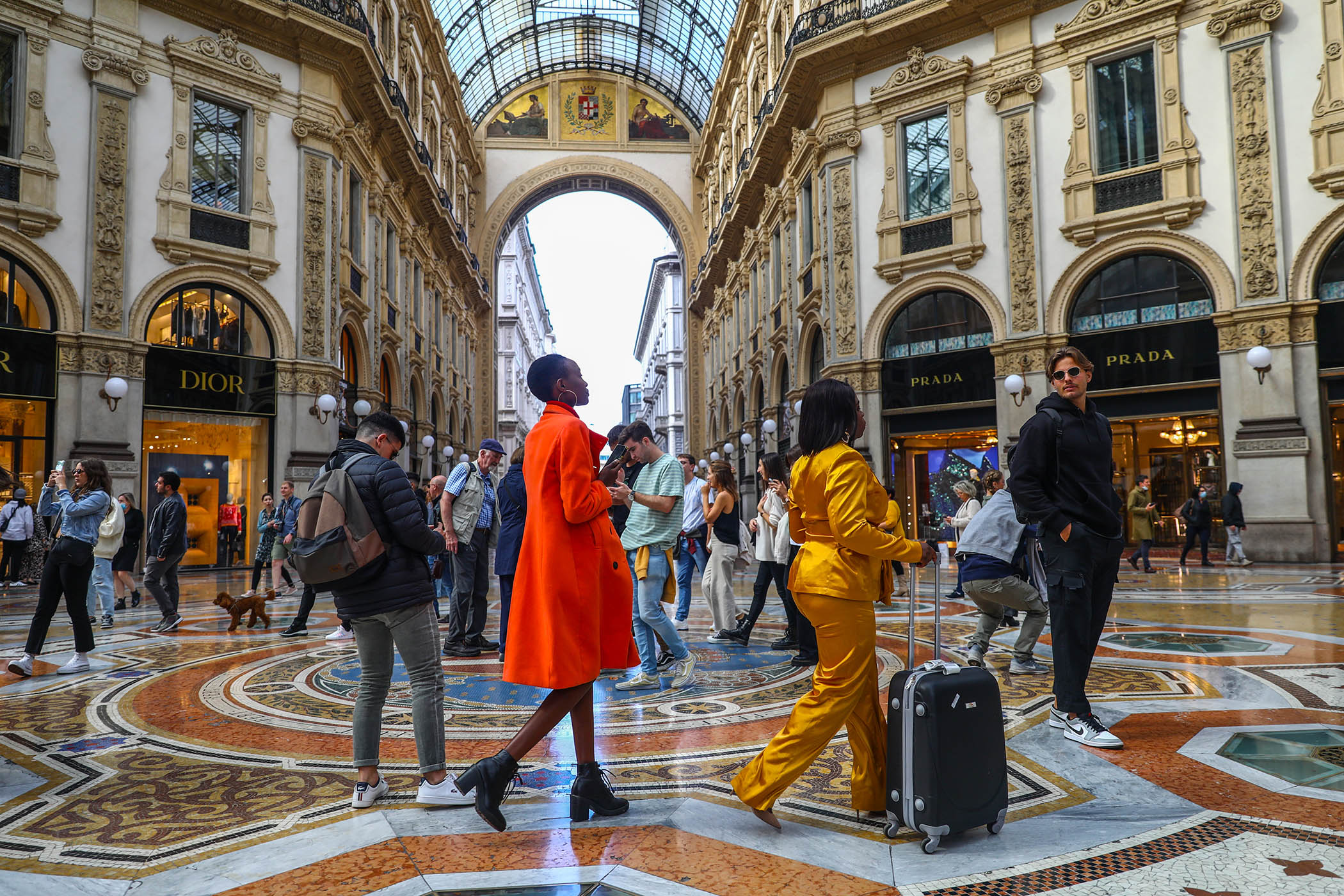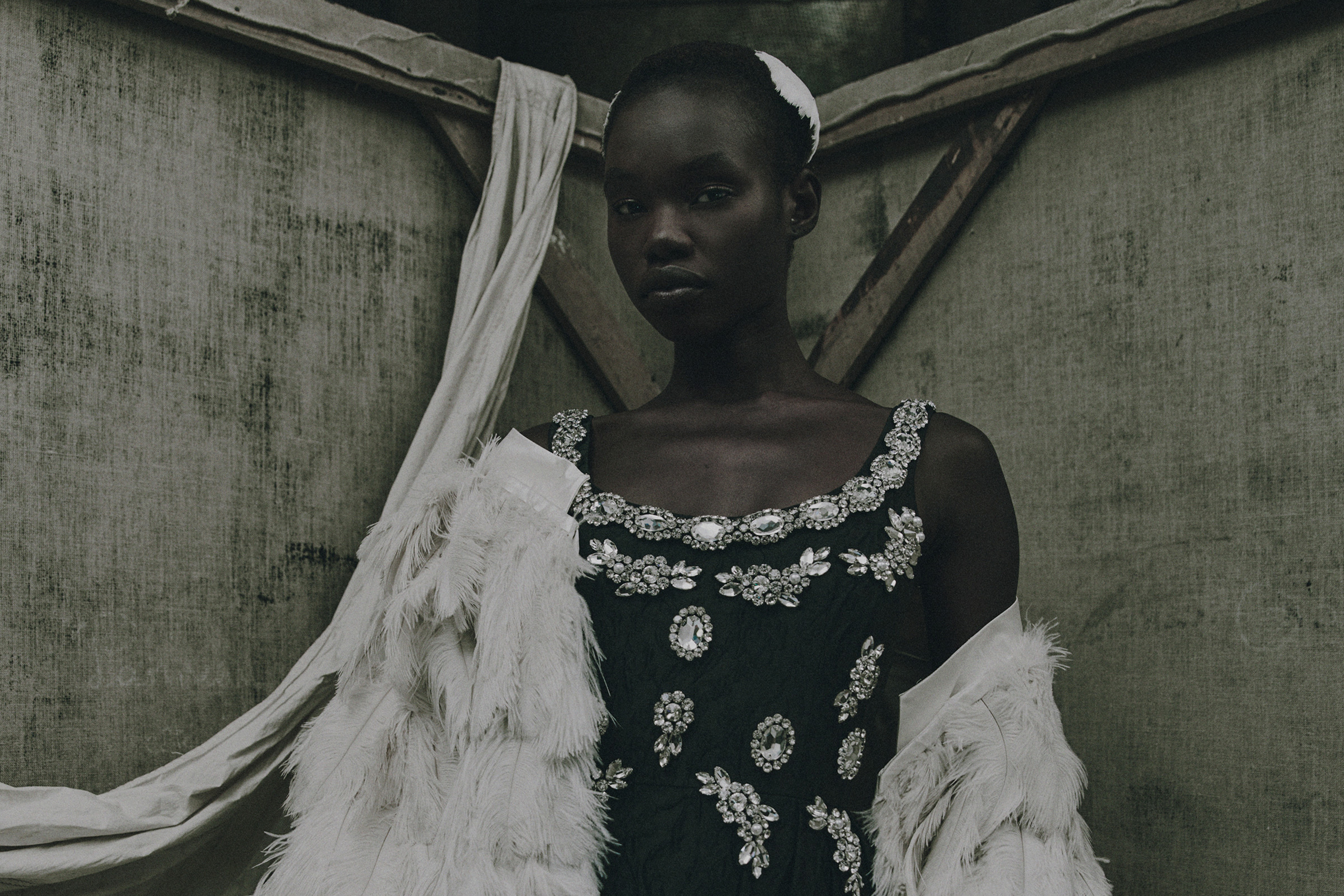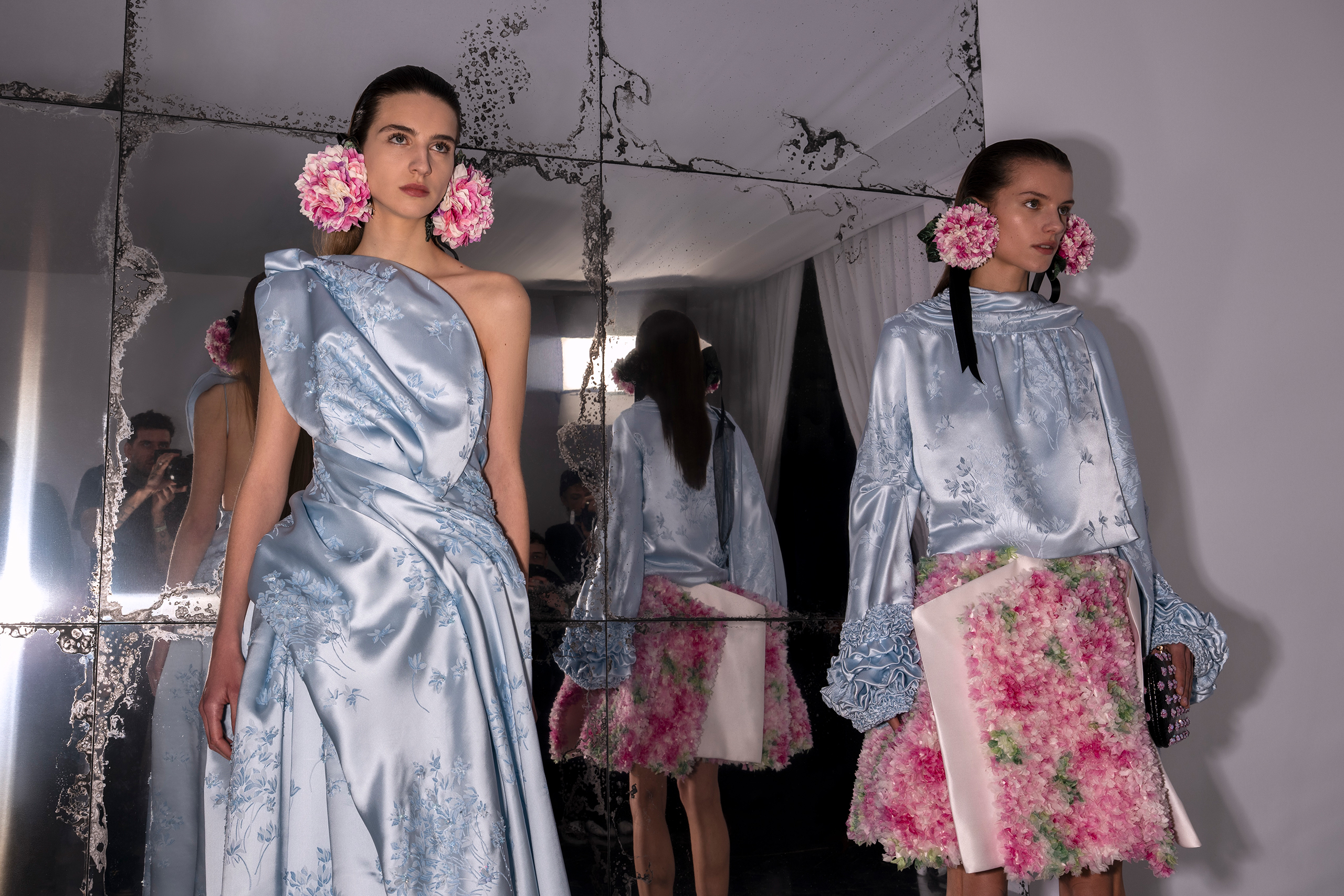In May an unnamed Chinese man arrived at a Milan hospital emergency room having been so badly beaten he was kept in hospital for almost two months.
He told police he’d been in the city since 2015 after signing a contract to work as a tailor for four hours a day earning €1,500 (£1,300) a month. He’d been living in the factory, forced to work 13 hours a day with no days off, just one half an hour break for lunch and one for dinner. In 2024, his wages stopped. He’d complained and was savagely attacked with fists and a plastic and aluminium pipe in an assault that lasted for several hours.
The police raided the factory he’d been trapped in and found padlocked dormitories, dining rooms, unsafe equipment, 12 workers – one Russian, one Italian and 10 Chinese nationals, five of whom were undocumented migrants – and five coat racks full of luxury cashmere jackets which retailed online for between £2,000 and £10,000.
The tag on the jackets was for the luxury Italian fashion brand Loro Piana, 80% owned by French luxury giant LVMH and marketed as “quiet luxury”. The company that made them – Clover Moda, owned by a Chinese businessman Hu Xizhai – was part of an elaborate supply chain created to cope with uncertain and irregular demands. The brand’s official subcontractor, Evergreen, owned by spouses Ermmano Brioschi and Teresa Provenzi, confessed it had been ill-equipped to meet Loro Piana’s orders and so sought two suppliers – Clover Moda and Hu Sufang – to help.
“They had this sudden demand on certain products due to the TV programme Succession,” says Nicola Mansfield, University of Westminster lecturer in fashion sustainability. “Luxury fashion sells for at least four times its cost price, and while labour is only 10% of that cost, it’s the easiest to drive down.”
“Luxury fashion sells for at least four times its cost price, and while labour is only 10% of that cost, it’s the easiest to drive down”
“Luxury fashion sells for at least four times its cost price, and while labour is only 10% of that cost, it’s the easiest to drive down”
Nicola Mansfield, University of Westminster
In her court testimony at the Loro Piana trial, Provenzi said they’d worked for the company since 2000, usually making between 200 and 3,000 jackets a season. In 2021, just as the couple downsized, orders surged with demands for 6-7,000 jackets. She claimed Loro Piana paid €118 a jacket – figures the company contests – so they passed production to two Chinese-run companies, instead paying them €86 for each jacket. Paperwork at Evergreen showed receipts from Loro Piana as well as inspection certificates from company auditors. And yet, Evergreen had mothballed its machines – something the court said should have been obvious.
In a statement to The Observer, Loro Piana blamed an “undisclosed and unauthorised sub-contractor” of one of its suppliers and said the supplier “did not inform Loro Piana of the existence of these sub-contractors”. It has since ended its contract with the supplier and said it “firmly condemns any illegal practices and reaffirms its unwavering commitment to upholding human rights and compliance with all applicable regulations throughout its supply chain”.
The court, however, found Loro Piana’s failures to police its supply chain “do not appear to be the result of isolated and improvised initiatives by individuals, but rather of an illicit corporate policy. During the investigations, an illegal practice emerged so entrenched and tested that it can be considered part of a broader corporate policy aimed at increasing business.”
The court has placed Loro Piana under judicial administration, originally introduced into Italian law to root out Mafia infiltration in businesses but increasingly used to combat illegal labour practices. This, the court stated, was “with the goal of freeing them as quickly as possible from criminal infiltration and returning them to the free market, cleansed of corrupting elements”.
The Business of Fashion, a trade journal, headlined its coverage of the case: “If you can’t trust Loro Piano, who can you trust?” The century-old label is a member of a particularly elite club, offering expensive cashmere clothing based on its reputation for ethical sourcing and close monitoring of its supply chain. But the mark-up and the reputation, argues Rosy Boardman at the University of Manchester, is based on a flawed business model.
Newsletters
Choose the newsletters you want to receive
View more
For information about how The Observer protects your data, read our Privacy Policy
“Luxury fashion is a smoke and mirrors game and these revelations are not going to help”
“Luxury fashion is a smoke and mirrors game and these revelations are not going to help”
Rosy Boardman, University of Manchester
“Luxury fashion hopes to sell 70% of its inventory at the top price to people who will pay for the glass of champagne in the store… but you can pick up the same garment at an outlet store a few months later for a fraction of the price,” she says. “It’s a smoke and mirrors game and these revelations are not going to help.”
The case followed an attempt by Milan’s fashion industry to show it was cleaning up its act after a number of high-end fashion houses – Alviero Martini, Armani, Valentino and a handbag-making arm of French giant Dior – were found to have illegal labour practices in their local supply chains. In June, the Palace of Justice in Milan hosted the signing of a “memorandum of understanding for the legality of procurement contracts in the fashion supply chain,” signed by fashion sector employers, trade unions, and the Milan criminal court.
The agreement – a voluntary platform for fashion brands and suppliers to sign up to and gain a certificate – has already been dismissed by one Rome lawyer whose work in the industry prevents him from speaking publicly. He said there was “no clear path” for employees to report externally and that the agreement was “toothless”.
Italian luxury fashion proudly markets its expensive goods as Made in Italy – “a symbol of crafting excellence, creativity and uniqueness”, according to the Valentino website. Made in Italy fashion is worth €96bn to the Italian economy and may be geographically correct, but in the past two years investigations led by the prosecutor Paolo Storari have torn apart the idea that this means hand-crafting artisans working on carefully tailored designs.
Storari, 59, is a remarkable investigator. He’s worked at the anti-Mafia directorate investigating drugs trafficking, election rigging and financial crime in the ’Ndrangheta, the Calabrian mafia. He investigated and prosecuted Lukasz Herba, the Polish gangster who kidnapped and drugged the British model Chloe Ayling in 2017 before auctioning her on the dark web. And he’s prosecuted the Italian subsidiaries of Amazon, DHL, Uber and Lidl over tax evasion and labour exploitation, fining Amazon Italy €121m, DHL Express Italy €49m, placing Uber Italy under judicial administration and arresting 15 local employees of Lidl, with four of Lidl Italy’s offices placed under state control.
Over the past two years, he has broken up the two hooligan firms of “ultras” running black market rackets at Milan’s San Siro stadium and quashed their murderous power struggle with the ’Ndrangheta and the Cosa Nostra for control of the stadium’s parking, merchandising and food kiosks take, as well as match day drug deals. This last investigation has placed him under police protection – two armed agents and a car. Storari has long refused protection and only accepted this escort when Milan’s police commissioner, Bruno Megale, and prefect Claudio Sgaraglia insisted.
His methodical takedown of high fashion’s slave labour practices began with a 2016 investigation into the slow infiltration of Milan’s Fiera Milano trade fair complex – which hosts Milan Fashion Week – by the ’Ndrangheta and the Cosa Nostra. One former Milan fashion worker told The Observer it was hard to separate mafia interests from Milan fashion even if direct involvement in the industry is hard to prove “because who do you think buys half of the couture designs?”
So far he has placed Alviero Martini under administration in November 2023, Armani in February 2024, Dior in April 2024, Valentino in February 2025 as well as Loro Piana this summer. In each case, the workshops have similar features – dormitories, illegal, underpaid and sometimes slave workers forced to use dangerous machines for 12 or 13 hours a day, seven days a week, in unsafe and unsanitary conditions.
Storari’s raids are thorough. The Observer has seen two videos of carabinieri entering Milan workshops. The videos are a little grainy, but the details are clear enough. While armed colleagues surround the building, carabinieri walk into a decrepit warehouse filled with young Chinese people working hard at beaten-up desks on old sewing machines. In one they find a baby asleep in a baby walker, a large storeroom in the corner filled with lethal chemicals, its door open on to the main working area, and then dormitories and kitchens where the workers clearly live. These are grim, almost Dickensian scenes of sweatshop exploitation.
There are piles of products – finished handbags or jackets. In one case, they find Dior handbags, which retail for between £3-5,000 and which, according to paperwork, cost between £50 and £60 to make – although Dior has refuted these prices in statements to the press.
Sources suggest that at least two more brands are in his sights – one expected in October and one in December. The main labels remaining under his area of jurisdiction are Prada, Bottega Venetta and Dolce & Gabbana, although it may well be another small firm.
The Observer contacted all the labels placed under administration. Two replied, Loro Piano and Giorgio Armani Operations (GAO), which said in a statement that its administration had been lifted early “thanks to the work done in recent months… making GAO a reference model for the category”.
It blamed “the behaviour of two of the numerous suppliers employed by the company who, in addition to violating the company’s code of ethics, betrayed the founding values of the Armani Group”.
Alviero Martini and Dior also had their 12-month judicial control ended after nine months. Valentino remains under court oversight.
Hakan Karaman at the Politechnico di Milano School of Management dismisses this. “The business model of fashion has been hijacked – it is a system that is driven by cost reduction and lead time efficiency,” he insists.
The result is that tactics have become increasingly “brutal” and internal communication breaks down, while third party auditors lack expertise to be effective. “This country is full of know-how and craftsmanship,” he says. “But this broken business model means luxury has betrayed its own values.”
Photograph by Beata Zawrzel/NurPhoto via Getty



